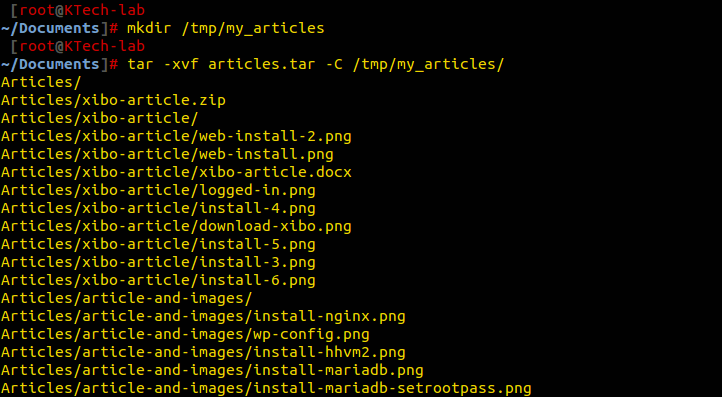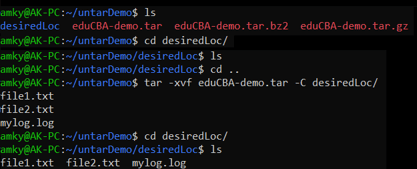

- #Linux untar to a specific directory how to#
- #Linux untar to a specific directory zip file#
- #Linux untar to a specific directory archive#
- #Linux untar to a specific directory download#
tar.gz is always handled as if the -gzip option had been specified (see -gzip, below).Īdd file to the archive.
#Linux untar to a specific directory archive#
For example, if this option is specified, an archive with the extension. Use the archive's suffix to determine the compression program. (If you're not sure what this means, you don't need to use this option.) The following options specify the way tar operates:. (This function doesn't work on magnetic tapes).Īppend files to the end of a tar archive.Īppend files, but only those that are newer than the copy in the archive. Specifying one of the following functions selects what tar's main mode of operation will be: A, -catenate,Ĭalculate any differences between the archive and the file system.ĭelete from the archive. With the long form, they may be given by appending " = value" to the option.įor example, the following commands are all equivalent: tar -create -file=archive.tar file1 file2 tar -c -f archive.tar file1 file2 tar -cf archive.tar file1 file2 tar cf archive.tar file1 file2 Functions Some options take a parameter with the single-letter form these must be given as separate arguments. A long function name must be prefixed with a double dash (" -"). A function letter does not need to be prefixed with a dash (" -"), and may be combined with other single-letter options. The first argument to tar should be a function specification: either one of the letters A, c, d, r, t, u, or x, or one of the long function names. delete | r -append | t -list | -test-label | u -update | Tar A -catenate -concatenate | c -create | d -diff -compare | This documentation covers the GNU version of tar, which is included with most modern variants of the Linux operating system. It was later formalized as part of the POSIX standard, and today is used to collect, distribute, and archive files, while preserving file system attributes such as user and group permissions, access and modification dates, and directory structures. Tar was originally developed in the early days of Unix for the purpose of backing up files to tape-based storage devices.

That’s it with extracting compressed files to a specific directory in Linux."Tar" stands for tape archive.

Ensure the directory exists or create it before extracting the files. To extract files to a specific directory use the -c or –directory as shown in the syntax below: $ tar -xf file-name.tar -C /path/to/directory $ tar -xf file-name.tar -directory /path/to/directoryįor example to extract backup.tar file to the /tmp/backup directory use the command shown. By default, the tar command will extract files to your current directory. The tar command allows you to create tar archive files as well as decompress them. Most files in linux are compressed using the tar format. Extracting tar/tar.gz/tgz files to a specific directory The unzip command cannot create a new directory on your system. Note: The directory you want to extract needs to be already in existence. Syntax: $ unzip zip-file-name.zip -d /path/to/directoryįor example, to extract an archive file named font-files.zip to the /tmp/new directory run the command: $ unzip font-files.zip -d /tmp/new If you want to extract the zipped files into a different directory, use the -d option followed by the path to the directory.
#Linux untar to a specific directory zip file#
By default, the unzip command extracts the zip file into your current working directory. The unzip command is used to extract zip files using the terminal. Extract zip files to a specific directory
#Linux untar to a specific directory how to#
In this article, we will learn how to extract files to a specific directory on your disk. On several occasions, you have to extract the contents of an archived file to a specific folder on your system.

There are several tools on Linux to decompress such files. These compressed files often have the following extensions such as zip, tar, tar.gz, gz
#Linux untar to a specific directory download#
This makes it easier and more convenient to download files while using far less bandwidth. Compressing files comes in handy when backing up important files or sending large files over the internet.


 0 kommentar(er)
0 kommentar(er)
